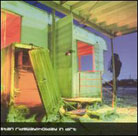February 2002
The promo sheet that accompanied my review copy of Ridgway’s new disc, Holiday In Dirt, puts some distance between him and Wall of Voodoo. "That was then. This is now," the sheet tells us. Fair enough. If Wall of Voodoo was bracing and strange fun, the music Ridgway has recorded on his own has been much more than that. Beginning with 1985’s The Big Heat, Ridgway has produced a series of records of almost indescribable depth and strange beauty. He’s retained the sense of fun that he exhibited in Wall of Voodoo, but added to it uncanny storytelling ability. Critics often compare him to Raymond Chandler, but his stories remind me more of Raymond Carver or Tobias Wolfe. Holiday In Dirt is a collection of rare and unreleased tracks, but it hangs together well. While there’s no unifying concept to the disc, it’s cohesive and has a strong sense of place. Ridgway is to Los Angeles as Lou Reed is to New York -- no place else could have produced him. He mixes the traditional with the new and has an openness to music as pure sound that comes, I think, from growing up in a city whose major industry is movies. Working in that atmosphere (at least one website indicates that Wall of Voodoo was formed to write music for low-budget movies) may have suggested to him the dramatic possibilities of sound -- a particularly important discovery for someone whose narratives are so complex. Whatever his influences, the salient feature of Ridgway’s discs is their sonic richness. The quality of his recordings is especially impressive given that the last three have been independent releases produced, one assumes, on limited budgets. His discs have a lot going on in them, but everything’s spread out across a wide soundstage in a kind of aural Cinemascope. For all the sonic detail Ridgway puts into his music, it rarely feels crowded. When a song does seem densely packed, as does "End of the Line" here, it sounds intentionally so. Holiday In Dirt contains two versions of "Beloved Movie Star" that shed some light on how Ridgway works. The first version, which opens the disc, is a lush arrangement that features a Duane Eddy-like guitar, drenched in reverb and tremolo, and a strummed harp. Synthesizers and other keyboards create a wash of sound that carries Ridgway’s voice along. The second version is an earlier, demo recording of the track. It’s much more spare. The harp still plays a prominent role and some of the keyboard touches that made their way to the finished track are hinted at in this version, but, overall, it’s less focused. Ridgway says in the liner notes that he prefers the demo, which is a little longer. I disagree; his instincts were correct when he revised the lyrics and altered his approach. He changed one verse and removed another altogether and sings in a less-inflected voice. The result is not just a tighter recording, but a stronger, more compassionate story. The vocals on the demo feel condescending, and the original verses needlessly restate some harsh observations about the perils of the movie business. What I found striking when I played the two versions side by side is how, even in a demo, Ridgway knows sonically what he wants to achieve. Certainly there are musical elements that are more developed in the final recording and details are added, but the overall feel is there at the beginning. As the music became more clearly defined, Ridgway toned down the vocals and cut some lyrics, in effect streamlining the story and allowing the music to evoke a deeper story than the words tell. One of the most enjoyable aspects of Ridgway’s music is his willingness to bring in ideas from sources far and wide. If a surf guitar is what will put his idea across, he’ll use it. A particularly strong influence appears to be film composer Ennio Morricone -- listen to the way Ridgway uses harmonica in a tune like "Time Inside." He doesn’t recycle ideas, though. He borrows techniques in order to create an atmosphere for the story he’s telling. In that sense, there’s an almost cinematic quality to his work. The recordings for Holiday In Dirt come from several sources and they vary in quality from very good to DIY. Ridgway is so sure of his goals that he isn’t going to let our notions of audiophile sound get in his way of creating an effect. For instance, one of the tunes, "Amnesia," was "sung through a three-inch, battery-powered speaker from Radio Shack. I really liked the sound." He’s right; it sounds great. So does the rest of the disc. GO BACK TO: |
 Stan Ridgway - Holiday In Dirt
Stan Ridgway - Holiday In Dirt![[Reviewed on CD]](../format/regcd.gif) Stan
Ridgway’s lone brush with stardom occurred in 1983, when his band Wall of Voodoo had
an unexpected hit with "Mexican Radio." The song and its accompanying video were
inspired examples of avant-garde loopiness. MTV put it in rotation, and it was the kind of
video you’d eagerly wait for -- it had the bizarre kick of something like Un
ChienAandalou, Bu˝uel's and Dali's classic surrealist film.
Stan
Ridgway’s lone brush with stardom occurred in 1983, when his band Wall of Voodoo had
an unexpected hit with "Mexican Radio." The song and its accompanying video were
inspired examples of avant-garde loopiness. MTV put it in rotation, and it was the kind of
video you’d eagerly wait for -- it had the bizarre kick of something like Un
ChienAandalou, Bu˝uel's and Dali's classic surrealist film.